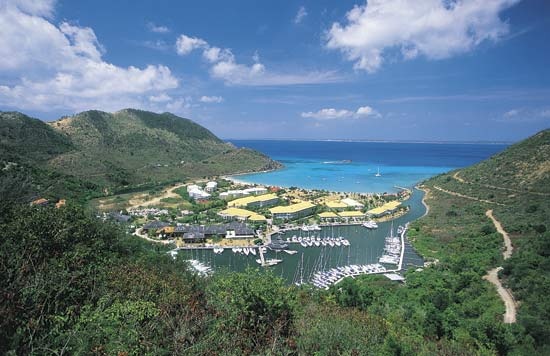Saint Martin
island, West Indies
Dutch Sint Maarten, French Saint-Martin
 island at the northern end of the Leeward (Leeward Islands) group of the Lesser Antilles in the Caribbean Sea. The island is hilly and receives about 45 inches (1,140 mm) of rain annually. The southern third is tied historically and administratively with the Kingdom of The Netherlands, the northern two-thirds with France.
island at the northern end of the Leeward (Leeward Islands) group of the Lesser Antilles in the Caribbean Sea. The island is hilly and receives about 45 inches (1,140 mm) of rain annually. The southern third is tied historically and administratively with the Kingdom of The Netherlands, the northern two-thirds with France.The island was named by Christopher Columbus (Columbus, Christopher) in honour of the saint on whose feast day he sighted it. Valued for its natural lakes of salt, a scarce commodity in Europe, it changed between Dutch and Spanish hands several times. In 1648 the Dutch returned to the island to find it occupied by the French, with whom they signed a partition treaty. Sugarcane plantations, worked by black slaves (ancestors of most of the present inhabitants), were important for a time but declined in the 19th century.
The Dutch (southern) part of the island, Sint Maarten, has coastal lagoons, salt pans, and sand spits. It became a part of the Dutch West Indies in 1828, and in 1845 it became one of the original territories of the Netherlands Antilles. The capital is Philipsburg. The economy draws increasingly on tourism as the government encourages exploitation of the island's most valuable natural resources, the clean beaches and pleasant climate.
The French (northern) part of the island, Saint-Martin, has beaches and forest-covered hills. It formerly belonged to the French overseas département of Guadeloupe but attained separate status as an overseas collectivity of France in 2007. Tourism developed rapidly in the late 20th century, and Saint-Martin is now a major Caribbean tourist destination. Trade flourishes in Marigot, the capital. Most of the people are of African or mixed African-European heritage. French is the official language, and English is widely spoken. Area, Dutch Sint Maarten, 13 square miles (34 square km); French Saint-Martin, 20 square miles (52 square km). Pop., Dutch Sint Maarten, (2005 est.) 35,035; French Saint-Martin, (1999) 29,078.
- Misrule, Lord of
- missal
- missi dominici
- missile
- missing link
- Mission
- mission
- Missionaries of Africa, Society of
- Missionary Ridge, Battle of
- Mission, Congregation of the
- Mission Indians
- Mission Range
- Mission style
- Mississauga
- Mississippi
- Mississippian culture
- Mississippian Subperiod
- Mississippi Bubble
- Mississippi College
- Mississippi, flag of
- Mississippi John Hurt
- Mississippi River
- Mississippi State University
- Mississippi, University of
- Mississippi Valley Campaign